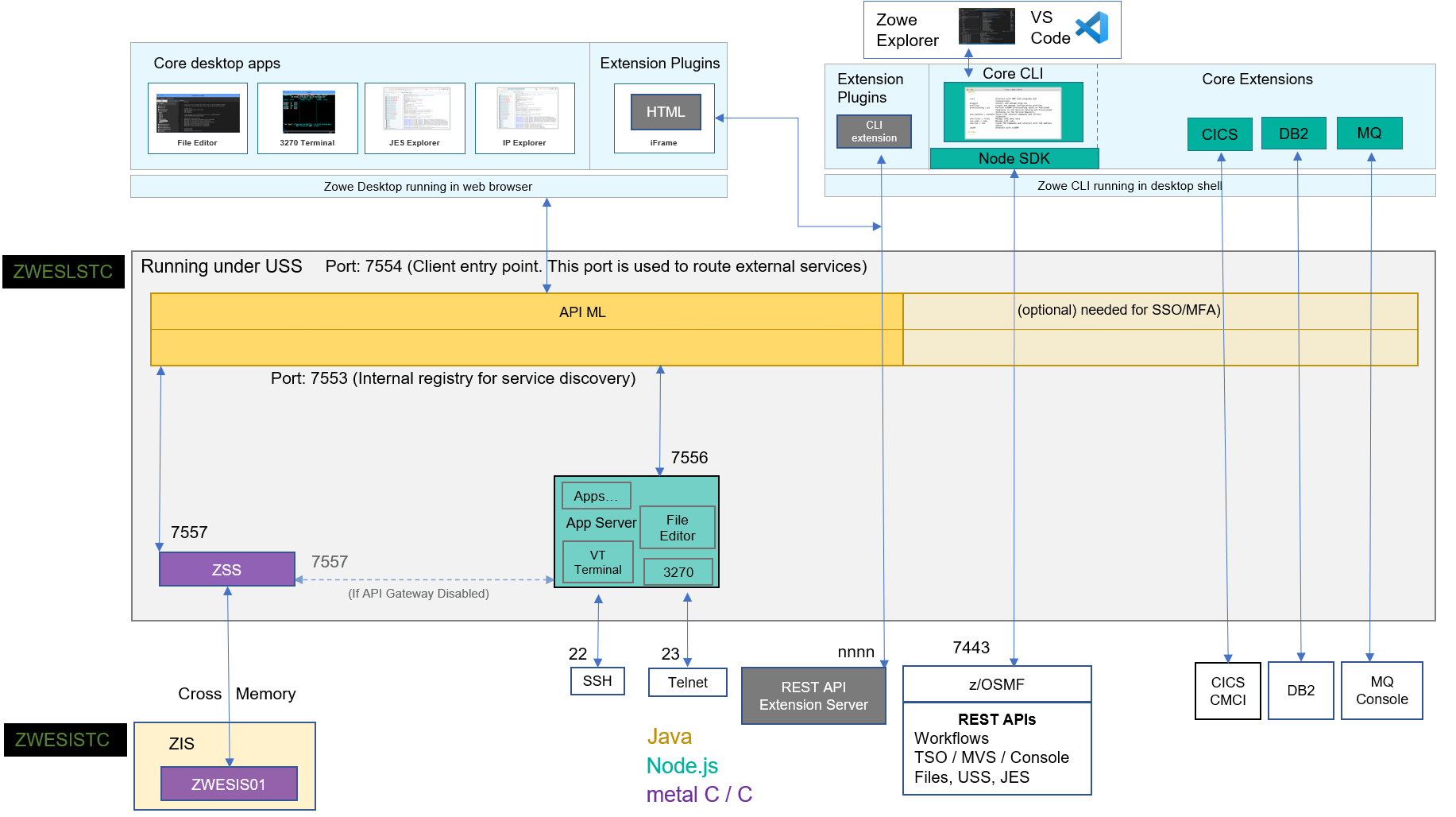Enabling Single-Service deployment of API Mediation Layer
Enabling Single-Service deployment of API Mediation Layer
Zowe version 3.3.0 introduced the option to switch the execution mode for API Mediation Layer (API ML) configuration from the previous multiple-service option to a single-service option based on "modulith" architecture.
From Zowe version 3.4.0 onwards, we recommend the single-service option. The workflow for new installations
will set the single-service deployment option in zowe.yaml.
Required roles: System Programmer, Network Administrator
This single-service deployment mode (which is also referred to as modulith mode) is an alternative to the multi-service scheme which brings the following performance benefits and simplification in configuration for new installations:
- Performance Improvements
Enhanced performance, faster startup times, reduced CPU and memory consumption - Operational Efficiency
Simplified deployment processes, a single JVM process, decreased network traffic - Unified configuration options
- Simplified debugging
Tracking communication between the API ML services to determine the cause and source of issues not required
To enable the single-service option in an existing installation, see Enable single-service deployment mode for API Mediation Layer.
Architecture
Review the following architecture of API ML single-service deployment mode.

Limitations
Kubernetes is not supported in Zowe 3.4 single-service deployment mode.
Breaking Changes
The following single-service deployment procedure assumes the default address space prefix ZWE1. Update this prefix according to the zowe.job.prefix parameter from your zowe.yaml file.
To run API ML as a single-service deployment, a system programmer is required to make configuration changes in the following areas:
- Update network configuration
In single-service deployment mode, all API ML components run in a single address space. - Update log prefixes to a unified prefix
In single-service deployment mode, a single log prefix applies to all API ML components. Prefixes for individual components require manual updates to unify prefixes under a single prefix. - Update AT-TLS rules
In single-service deployment mode, jobname filters require updating, and rules applying to handling require deletion.
Update network configuration
Single-service deployment mode runs all API ML components in a single JVM process. For backward compatibility reasons, this single JVM process handles connections to both the Gateway Service and the Discovery Service ports.
The single-service API ML address space uses ports defined in components.gateway.port and components.discovery.port (defaults 7554 and 7553).
Update the network permissions to reflect this change. Ensure that both ports are under z/OS address space ZWE1AG.
The remaining ports described under the API Mediation Layer category in the multi-service deployment section of article Address Network Requirements (defaults 7552, 7555, and 7558) are no longer used in single-service deployment mode.
The Caching Service is enabled in single-service deployment mode and the default is infinispan. Note that the infinispan storage solution requires additional ports. For more information, see Caching Service Infinispan ports.
Update log prefix
In single-service deployment mode, logs from internal API ML components such as the Discovery Service, API Catalog, and Caching Service appear under the prefix ZWE1AG.
Example:
In multi-service deployment mode, the following message is printed under ZWE1AC:
2025-07-29 08:13:44.560 <ZWE1AC:main:17171209> [35mZWESVUSR[0;39m [36mINFO [0;39m ((o.z.a.p.s.ServiceStartupEventHandler)) ZWEAM000I API Catalog Service started in 71.757 seconds
In single-service deployment mode, the message is printed under ZWE1AG:
2025-07-29 08:13:44.560 <ZWE1AG:main:17171209> [35mZWESVUSR[0;39m [36mINFO [0;39m ((o.z.a.p.s.ServiceStartupEventHandler)) ZWEAM000I API Catalog Service started in 71.757 seconds
Note that the message code ZWEAM000I remains unchanged.
This change affects only logs printed to spool or USS files. WTOs remain unchanged.
Update AT-TLS rules
If your installation is configured with AT-TLS, you will need to update the rules. Perform the following updates to the PAGENT rules:
-
Update job name filters to use
ZWE1AG.Verify if the outbound rule for z/OSMF is set in your system. Update the rule to apply to jobname
ZWE1AGinstead ofZWE1AZas authentication may not work by default in single-service deployment mode. -
Remove unneeded rules that handle communication between core components in multi-service deployment.
- Remove rules that apply to communication between Gateway, Discovery Service, API Catalog, and Caching Service.
- Remove all rules that apply to the core components except for rules that apply to the Gateway Service (
ZWE1AG). - Remove ports which are no longer used from the server rules. See Enabling AT-TLS rules.
-
In High Availability scenarios, TCP communication still exists between LPARs for the Discovery Service port.
-
TCP HTTP calls are still in use for High Availability scenarios to maintain synchronization between instances across LPARs.
-
In general, rules for AT-TLS in single-service deployment are now simplified, wherein API ML uses a single z/OS address space prefix and uses only two ports. Update rules to remove ports are no longer used.
Once you complete updates to your ports, log prefixes, and AT-TLS rules (if applicable), you are ready to enable single-service deployment mode.
Enable single-service deployment mode for API Mediation Layer
To enable single-service deployment mode for API ML, perform the following changes to the installation's zowe.yaml file:
-
Add the component
apimland enable it:components:
apiml:
enabled: trueNote: If the Caching Service is not configured on your system, follow the steps described in Using the Caching Service to configure the Caching Service. The Caching Service is enabled by default in the single-service deployment of API Mediation Layer.
-
Start the Zowe started task.
Roll back changes from single to multi-service deployment mode
It is possible to revert to the original multi-service deployment mode by reverting changes in the zowe.yaml file:
-
Disable the
apimlcomponent: Setcomponents.apiml.enabledtofalse. -
Start the Zowe started task.
Future support for multi-service deployment mode
The option to roll back to multi-service deployment mode will remain for the duration of the Zowe v3 lifecycle.